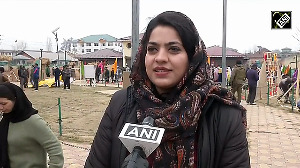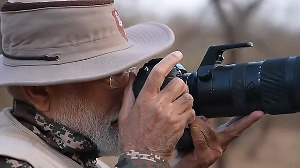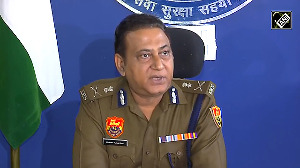The project officer of the District Rural Development Agency in Kanyakumari is a young and dynamic man. He is also a busy man, wielding two cellphones and barking away orders to the relief workers.
Selvarajan is the coordinating officer for aid in this southernmost tip of the Indian subcontinent, which was struck by tsunamis on the Sunday after Christmas.
Asia toll rises to 60,000 | More News
His tasks range from arranging for stretchers and rations to getting diesel for 21 vehicles engaged in relief work.
This writer accompanied him on one of his rounds to a campsite.
On the way, he explains that till Tuesday food was being cooked in the district headquarters Nagercoil and then dispatched to the camps.
'The fishermen don't like the tamarind rice we give, so today we are going to supply rice, dal (lentil) and vegetables' he says.
Who will distribute all the aid pouring in?
The collector has directed that there should be food packets available for all at all times.
Selvarajan has called for 2000 food packets, while emphasising, 'I don't want tamarind rice, make vegetable biryani, tomato rice or anything interesting.'
The government priority on the first two days after the incident was food and disposing of dead bodies.
Now the relief teams are moving on to supplying rice, cereal and clothing and ensuring sanitation, which is key to prevent any outbreak of epidemics.
We reach Seeurpuram campsite, one of the 45 such sites dotting the area.
Here's how you can help | Helplines for the victims
This one is housed inside a church.
UNICEF workers are present with us. Deepak Rai of UNICEF has suggested that 50 toilets be built for the 2000 or so refugees.
Sixty-metre-long row of pits has to be dug. The pits will then be covered with concrete slabs, each with a pan would be embedded in it.
Selvarajan says he has called up the government engineers and told them to start work on the project immediately. The locals have also been asked to chip in by digging holes for the purpose.
The toilets will be segregated with thatches made of bamboo poles and coconut fronds.
At the pace at which it is being planned, it would be ready by Thursday morning, he informs.
Orders have been to all the camps in the area to follow suit.
Images: Friends in need | Anguish, despair, hope
Saying that the Colachel area tahsildar has been given Rs 15 lakh to be distributed among the needy, the officer assures rediff.com that funds were no constraint.
The locals have also been asked to contribute in every little way they can. Banana farmers, for example, were requested by Selvarajan to donate free fruit for the victims.
Meanwhile, the operation to find dead bodies continues unabated. Sniffer dogs are being used to find bodies trapped under the sludge.
The next task on the DRDA agenda is clothing and finally shelter.






 © 2025
© 2025